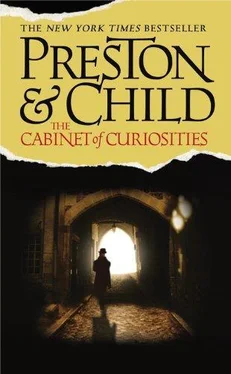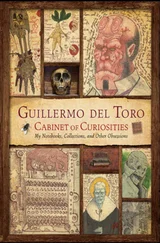Douglas Preston - The Cabinet of Curiosities
Здесь есть возможность читать онлайн «Douglas Preston - The Cabinet of Curiosities» весь текст электронной книги совершенно бесплатно (целиком полную версию без сокращений). В некоторых случаях можно слушать аудио, скачать через торрент в формате fb2 и присутствует краткое содержание. Жанр: Триллер, на английском языке. Описание произведения, (предисловие) а так же отзывы посетителей доступны на портале библиотеки ЛибКат.
- Название:The Cabinet of Curiosities
- Автор:
- Жанр:
- Год:неизвестен
- ISBN:нет данных
- Рейтинг книги:3 / 5. Голосов: 1
-
Избранное:Добавить в избранное
- Отзывы:
-
Ваша оценка:
- 60
- 1
- 2
- 3
- 4
- 5
The Cabinet of Curiosities: краткое содержание, описание и аннотация
Предлагаем к чтению аннотацию, описание, краткое содержание или предисловие (зависит от того, что написал сам автор книги «The Cabinet of Curiosities»). Если вы не нашли необходимую информацию о книге — напишите в комментариях, мы постараемся отыскать её.
The Cabinet of Curiosities — читать онлайн бесплатно полную книгу (весь текст) целиком
Ниже представлен текст книги, разбитый по страницам. Система сохранения места последней прочитанной страницы, позволяет с удобством читать онлайн бесплатно книгу «The Cabinet of Curiosities», без необходимости каждый раз заново искать на чём Вы остановились. Поставьте закладку, и сможете в любой момент перейти на страницу, на которой закончили чтение.
Интервал:
Закладка:
Leng had affixed a padlock to the coal cellar door. Seeing this, I was momentarily overcome by a sense of relief. I had done my utmost; there was nothing else but mount the stairs. I even went so far as to turn around and take the first step. Then I stopped. The same impulse that had brought me this far would not let me leave until I had seen this bad business through.
I raised my foot to kick in the door. Then I hesitated. If I could contrive to remove the lock with a pair of bolt cutters, I reasoned, Leng would think it the work of a sneak-thief.
It was the work of five minutes to retrieve the necessary implement and cut through the hasp of the lock. I dropped it to the ground, then pushed the door wide, allowing the afternoon light to stream down the stairway behind me.
Immediately upon entering, I was overwhelmed with far different sensations than those that had gripped me on the third floor. Whatever work had ceased in Leng’s chambers was, clearly, still active here.
Once again, it was the odor I noticed first. As before, there was a smell of caustic reagents, perhaps mixed with formaldehyde or ether. But these were masked by something much richer and more powerful. It was a scent I recognized from passing the hog butcheries on Pearl and Water Streets: it was the smell of a slaughterhouse.
The light filtering down the rear stairs made it unnecessary for me to ignite the gas lamps. Here, too, were numerous tables: but these tables were covered with a complicated sprawl of medical instruments, surgical apparatus, beakers, and retorts. One table contained perhaps three score small vials of light amber liquid, carefully numbered and tagged. A vast array of chemicals were arranged in cabinets against the walls. Sawdust had been scattered across the floor. It was damp in places; scuffing it with the toe of my boot, I discovered that it had been thrown down to absorb a rather large quantity of blood.
I knew now that my apprehensions were not entirely without merit. And yet, I told myself, there was still nothing to raise alarm here: dissections were, after all, a cornerstone of science.
On the closest table was a thick sheaf of carefully jotted notes, gathered into a leather-bound journal. They were penned in Leng’s distinctive hand. I turned to these with relief. At last, I would learn what it was Leng had been working towards. Surely some noble scientific purpose would emerge from these pages, to give the lie to my fears.
The journal did no such thing.
You know, old friend, that I am a man of science. I have never been what you might call a God-fearing fellow. But I feared God that day — or rather, I feared his wrath, that such unholy deeds — deeds worthy of Moloch himself — had been committed beneath my roof.
Leng’s journal spelt it out in unwavering, diabolical detail. It was perhaps the clearest, most methodical set of scientific notes it has been my eternal misfortune to come across. There is no kind of explanatory gloss I can place upon his experiments; nothing, in fact, I can do but spell it all out as plainly and succinctly as I can.
For the last eight years, Leng has been working to perfect a method of prolonging human life. His own life, by evidence of the notations and recordings in the journal. But — before God, Tinbury — he was using other human beings as material. His victims seemed made up almost entirely of young adults. Again and again, his journal mentioned dissections of human craniums and spinal columns, the latter on which he seems to have focused his depraved attentions. The most recent entries centered particularly on the cauda equina, the ganglion of nerves at the base of the spine.
I read for ten, then twenty minutes, frozen with fascination and horror. Then I dropped the abhorrent document back onto the table and stepped away. Perhaps I was a little mad at that point, after all; because I still contrived to find logic in all of this. Body-snatching the recent dead from graveyards is an unfortunate but necessary practice in the medical climate of our day, I told myself. Cadavers for medical research remain in critically short supply, and there is no way to supply the need without resorting to grave-robbing. Even the most respectable surgeons need resort to it, I told myself. And even though Leng’s attempts at artificially prolonging life were clearly beyond the pale, it was still possible he might unintentionally achieve other breakthroughs that would have beneficial effects…
It was at that point, I believe, that I first noticed the sound.
To my left, there was a table I had not taken note of before. A large oilcloth had been spread over it, covering something large and rather bulky. As I watched, the faint sound came again, from beneath the oilcloth: the sound of some animal dispossessed of tongue, palate, vocal cords.
I cannot explain where I found the strength to approach it, other than my own overpowering need to know. I stepped forward, and then — before my resolution could falter — I gripped the greasy cloth and drew it away.
The sight uncovered in that dim light will haunt me until my last day. It lay upon its stomach. A gaping hole lay where the base of the spine had once been. The sound I had heard was, it seemed to me, the escaping gases of decay.
You might have thought me incapable of registering fresh shock at this point. Yet I noticed, with a rising sense of unreality, that both the corpse and the wound appeared fresh.
I hesitated for perhaps five, perhaps ten seconds. Then I drew closer, my mind possessed by one thought, and one thought only. Could this be the body that had bled so profusely on Leng’s floor? How, then, to explain the rawness of the wound? Was it possible — even conceivable — that Leng would make use of two corpses within the span of a single week?
I had come this far: I had to know all. I reached forward, gingerly, to turn the body and check its lividity.
The skin felt supple, the flesh warm in the humid summer cellar. As I turned the body over and the face was exposed, I saw to my transcendent horror that a blood-soaked rag had been knotted around the mouth. I snatched my hand away; the thing rolled back onto the table, face upwards.
I stepped back, reeling. In my shock, I did not immediately understand the terrible import of that blood-soaked rag. I think if I had, I would have turned and fled that place — and in so doing been spared the final horror.
For it was then, McFadden, that the eyes above the rag fluttered open. They had once been human, but pain and terror had riven all humanity from their expression.
As I stood, transfixed by fear, there came another low moan.
It was, I knew now, not gas escaping from a corpse. And this was not the work of a man who trafficked with body snatchers, with corpses stolen from graveyards. This poor creature on the table was still alive. Leng practiced his abominable work on those who still lived.
Even as I watched, the horrible, pitiable thing on the table moaned once more, then expired. Somehow, I had the presence of mind to replace the body as I had found it, cover it with the oilcloth, close the door, and climb up out of that charnel pit into the land of the living…
I have barely moved from my chambers within the Cabinet since. I have been trying to gather courage for what I know in my heart remains to be done. You must see now, dear colleague, that there can be no mistake, no other explanation, for what I found in the basement. Leng’s journal was far too comprehensive, too diabolically detailed, for there to be any misapprehension. As further evidence, on the attached sheet I have reproduced, from memory, some of the scientific observations and procedures this monstrous man recorded within its pages. I would go to the police, except I feel that only I can—
Читать дальшеИнтервал:
Закладка:
Похожие книги на «The Cabinet of Curiosities»
Представляем Вашему вниманию похожие книги на «The Cabinet of Curiosities» списком для выбора. Мы отобрали схожую по названию и смыслу литературу в надежде предоставить читателям больше вариантов отыскать новые, интересные, ещё непрочитанные произведения.
Обсуждение, отзывы о книге «The Cabinet of Curiosities» и просто собственные мнения читателей. Оставьте ваши комментарии, напишите, что Вы думаете о произведении, его смысле или главных героях. Укажите что конкретно понравилось, а что нет, и почему Вы так считаете.










